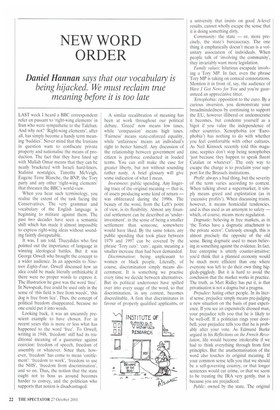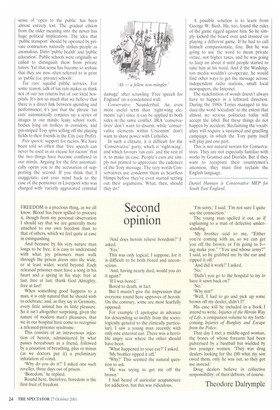NEW WORD ORDER
Daniel Hannan says that our vocabulary is
being hijacked. We must reclaim true meaning before it is too late
LAST week I heard a BBC correspondent refer en passant to 'right-wing elements' in Iran who were sympathetic to the Taleban. And why not? 'Right-wing elements', after all, has simply become a handy term meaning taddies'. Never mind that the Iranians in question want to confiscate private property and nationalise the means of production. The fact that they have lined up with Mullah Omar means that they can be neatly bracketed with Israeli hard-liners, Stalinist nostalgics, Timothy McVeigh, Eugene Terre Blanche, the BNP, the Tory party and any other 'right-wing elements' that threaten the BBC's world-view.
When you hear such terminology, you realise the extent of the task facing the Conservatives. The very grammar and vocabulary of the English language is beginning to militate against them. The past two decades have seen a semantic shift which has made it almost impossible to express right-wing ideas without sounding faintly disreputable.
It was, I am told, Thucydides who first pointed out the importance of language in winning ideological battles. But it was George Orwell who brought the concept to a wider audience. In an appendix to Nineteen Eighty-Four, Orwell discussed how an idea could be made literally unthinkable if there were no proper words to express it. The illustration he gave was the word 'free'. In Newspeak, free could be used only in the sense of 'this field is free from weeds', 'this dog is free from lice'. Thus, the concept of political freedom disappeared, because no one could put it into words.
Looking back, it was an uncannily prescient example to have chosen. For in recent years this is more or less what has happened to the word 'free'. To Orwell, writing in 1948, 'freedom' still had its traditional meaning of a guarantee against coercion: freedom of speech, freedom of assembly or whatever. Since then, however, 'freedom' has come to mean 'entitlement': 'freedom to work', 'freedom to use the NHS', 'freedom from discrimination', and so on. Thus, the notion that the state ought not to boss us around becomes harder to convey, and the politician who supports that notion is disadvantaged. A similar recalibration of meaning has been at work throughout our political debate. 'Greed' now means low taxes, while 'compassion' means high taxes. 'Fairness' means state-enforced equality, while 'unfairness' means an individual's right to better himself. Any discussion of the relationship between government and citizen is perforce conducted in loaded terms. You can still make the case for greater liberty, but not without sounding rather nasty. A brief glossary will give some indication of what 1 mean.
Investment: public spending. Any lingering trace of the original meaning — that is, of assets producing some kind of return — was obliterated during the 1990s. The beauty of the word, from the Left's point of view, is its flexibility. Almost any financial settlement can be described as 'underinvestment', in the sense of being a smaller settlement than someone, somewhere would have liked. By the same token, any public spending that took place between 1979 and 1997 can be covered by the phrase 'Tory cuts': 'cuts', again, meaning a smaller increase than had been demanded.
Discrimination: being unpleasant to women or black people. Literally, of course, discrimination simply means discernment. It is something we practise every time we decide between alternatives. But its political undertones have spilled over into every usage of the word, so that discrimination, in any context, becomes discreditable. A firm that discriminates in favour of properly qualified applicants, or
a university that insists on good A-level results, cannot wholly escape the sense that it is doing something dirty.
Community: the state — or, more precisely, the state's bureaucracy. The one thing it emphatically doesn't mean is a voluntary association of individuals. When people talk of 'involving the community', they invariably want more legislation.
Family values: hilarious escapade involving a Tory MP. In fact, even the phrase Tory MP is taking on comical connotations. Mention it in front of, say, the audience of Have I Got News for You and you're guaranteed an appreciative titter.
Xenophobia: opposition to the euro. By a curious inversion, you demonstrate your broadmindedness by continuing to support the EU, however illiberal or undemocratic it becomes, but condemn yourself as a bigot if you value the independence of other countries. Xenophobia (or 'Europhobia') has nothing to do with whether you feel comfortable with other cultures. As Neil Kinnock recently told this magazine, sceptics don't stop being xenophobes 'just because they happen to speak fluent Catalan or whatever'. The only way to escape the charge is to proclaim your support for the Brussels institutions.
Profit: always a bad thing, but the severity of the term varies according to context. When talking about a supermarket, it simply means greed and exploitation (as in 'excessive profits). When discussing trains, however, it means homicidal tendencies, and is thus used as an antonym to safety — which, of course, means more regulation.
Dogmatic: believing in free markets, as in 'the Tories have a dogmatic attachment to the private sector'. Curiously enough, this is almost precisely the opposite of the old sense. Being dogmatic used to mean believing in something against the evidence. In fact, free enterprise is utterly counter-intuitive: you'd think that a planned economy would be much more efficient than one where everyone was left to do their own thing higgledy-piggledy. But it is hard to avoid the conclusion that the market works in practice. The truth, as Matt Ridley has put it, is that privatisation is not a dogma but a pragma.
Prejudice: hating other people. In its literal sense, prejudice simply means pre-judging a new situation on the basis of past experience. If you see an expensively dressed man, your prejudice tells you that he is likely to be well-off. If a politician rings your doorbell, your prejudice tells you that he is probably after your vote. As Edmund Burke argued in his Reflections on the French Revolution, life would become intolerable if we had to think everything through from first principles. But the anathematisation of the word also touches its original meaning. If your common sense tells you that we should be a self-governing country, or that longer sentences would cut crime, or that we seem to be treating the IRA very gently, that is because you are prejudiced.
Public: owned by the state. The original
sense of 'open to the public' has been almost entirely lost. The gradual elision from the older meaning into the newer has huge political implications, The idea that 'public transport' should be operated by private contractors naturally strikes people as anomalous. Ditto 'public health' and 'public education'. Public schools were originally so called to distinguish them from private tutors. Yet that sense has become so archaic that they are now often referred to in print as 'public (i.e. private) schools',
Tax cuts: squalid public services. For some reason, talk of tax cuts makes us think not of our tax returns but of our local hospitals. Ifs not so much that we believe that there is a direct link between spending and performance; it's just that the phrase 'tax cuts' automatically conjures up a series of images in our minds: leaky school roofs, bodies lying on trolleys in corridors, and pin-striped Tory spivs selling off the playing fields to their friends in the City (see Profit).
Free speech: support for racists. We have been told so often that 'free speech can never be used as an excuse for racism' that the two things have become conflated in our minds. Arguing for the first automatically opens you to the accusation of supporting the second. If you think that I exaggerate, cast your mind back to the case of the pensioner in Liverpool who was charged with 'racially aggravated criminal damage' after scrawling 'Free speech for England' on a condemned wall.
Conservative: Neanderthal. An even more useful term than 'right-wing elements' (qv) since it can be applied to both sides in the same conflict. IRA 'conservatives' don't want to disarm. while 'conservative elements within Unionism' don't want to share power with Catholics.
In such a climate, it is difficult for the 'Conservative' party, which is 'right-wing', and which favours 'tax cuts' and the rest of it, to make its case. People's ears are simply not primed to appreciate the cadences of the Tory message. The very words Conservatives use condemn them as heartless blimps before they've even started setting out their arguments. What, then, should they do?
A possible solution is to learn from George W. Bush. He, too, found the rules of the game rigged against him. So he simply kicked the board over and insisted on playing a different game. If he had to call himself compassionate, fine. But he was going to use the word to mean private virtue, not higher taxes, and he was going to harp on about it until people started to take him at his word. And if the Washington media wouldn't co-operate, he would find other ways to get the message across: independent radio stations, small local newspapers, the Internet.
The redefinition of words doesn't always have to happen in a leftward direction. During the 1980s Tories managed to traduce the word 'socialism' to the extent that almost no serious politician today will accept the label. But these things do not happen by accident. Reclaiming the vocabulary will require a sustained and gruelling campaign, in which the Tory party itself will play just one part.
This is not natural terrain for Conservatives. They are not especially familiar with works by Gramsci and Derrida. But if they want to recapture their countrymen's attention, they must first reclaim the English language.
Daniel Hannan is Conservative MEP for South East England.











































































 Previous page
Previous page